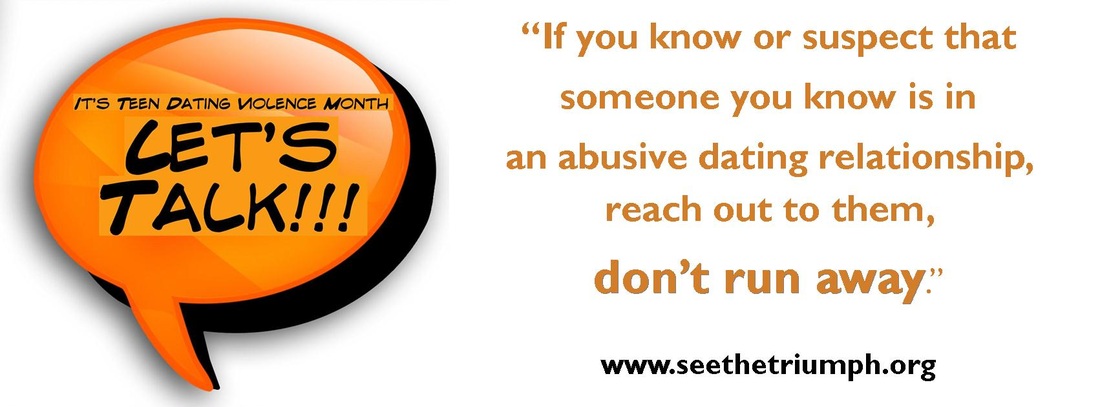|
By Christine Murray, See the Triumph Co-Founder
I know it’s not easy to know or suspect that someone you know is in an abusive relationship. It can be frustrating, scary, and challenging to know what to say or do in this situation. On the one hand, you want to help that person. But on the other hand, you also respect their privacy and right to make decisions for themselves. You may have tried to help in the past, but they weren’t responsive. You might not agree with the decisions they’re making to stay in their abusive relationship. Or, you might just not know what to say. Today, I want to share with you some stories from the survivors in our studies that show just how important it is to reach out to people who are being abused. Because this is Teen Dating Violence Month, for today I’m just focusing on participants who were in dating relationships (i.e., they said that they were in dating relationships or were in committed relationships but not living with their partners when we asked them to describe the highest level of commitment they had in their past abusive relationships). Of course, many survivors in other types of relationships, such as marriage or domestic partnerships, face similar experiences. However, following our theme of “It’s Teen Dating Violence Month: Let’s Talk!!!”, I wanted to focus today on the importance of reaching out to those who are experiencing abuse in dating relationships. Through our research, we’ve learned that isolation is a big part of the stigma surrounding intimate partner violence. This isolation can be so powerful that many people in abusive relationships come to feel that they have literally nobody they can turn to for help or support. Isolation was a very common theme for the survivors in our studies who had experienced dating violence. Let’s take a closer look at how that isolation can happen. First, the isolation can result from the abusive partner’s controlling behaviors. As examples, here are a few quotes from survivors of dating violence from our research:
And finally, some survivors find that when they reach out for help, the people they reach out to distance themselves or provide unsupportive responses. For example, one survivor said:
All of these factors can add to the isolation that dating violence survivors may encounter. I know it’s hard, but for all these reasons, if you know or suspect that someone you know is in an abusive dating relationship, reach out to them, don’t run away. Chances are, they are already feeling quite isolated and lonely. Be prepared that they may not initially want to or feel safe to do anything different to leave or change their relationship. This can be very frustrating to watch. However, you can send a powerful message to this person by letting them know: “You don’t have to face this alone.” Comments are closed.
|
Archives
July 2024
CategoriesAll About Intimate Partner Violence About Intimate Partner Violence Advocacy Ambassadors Children Churches College Campuses Cultural Issues Domestic Violence Awareness Month Financial Recovery How To Help A Friend Human Rights Human-rights Immigrants International Media Overcoming Past Abuse Overcoming-past-abuse Parenting Prevention Resources For Survivors Safe Relationships Following Abuse Schools Selfcare Self-care Sexual Assault Sexuality Social Justice Social-justice Stigma Supporting Survivors Survivor Quotes Survivor-quotes Survivor Stories Teen Dating Violence Trafficking Transformative-approaches |
Search by typing & pressing enter



 RSS Feed
RSS Feed